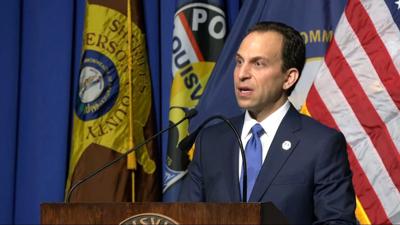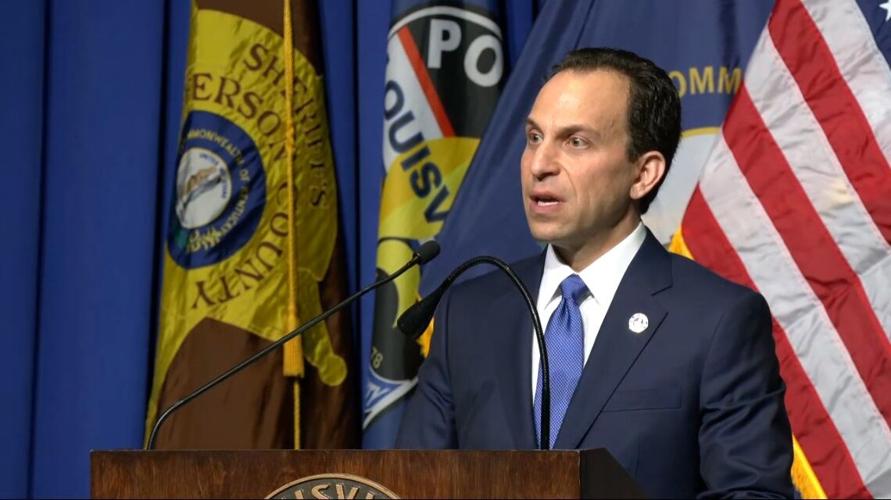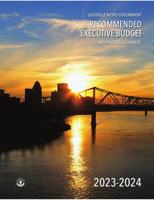LOUISVILLE, Ky. (WDRB) – Mayor Craig Greenberg unveiled his first proposed budget on Thursday, a $1.1 billion spending plan for the coming year that would fund a wide range of priorities.
Greenberg, a Democrat who took office in January, began addressing the Metro Council on the budget shortly after 4 p.m. It includes $868 million in operating funds for city agencies' day-to-day work and $225 million in capital projects.
The budget also sets aside $83.4 million for Metro government’s reserve account known as a “rainy day fund.”
Greenberg told reporters and some Metro Council staff and members at a briefing earlier in the day that the budget covers all parts of Louisville, invests in police and public safety, spends targeted money on combating gun violence and aims to boost downtown.
“I believe it has all the contents to truly move Louisville in a new direction to make Louisville a safer city, a stronger city, a healthier city, to do some restructuring with our government so that it is effective every day, that we're getting a return on our investment for every dollar that we're investing in resources and services that our city provides to the entire community,” he said.
The Metro Council will debate and ultimately vote on the budget proposal in the weeks and months ahead.
Here’s a breakdown of some areas Greenberg’s plan would fund:
Downtown
- $8 million for a Downtown Revitalization Fund. Details are still being worked out, but Greenberg said he envisions a loan fund that would focus on downtown housing and attracting new businesses. “So that's going to be our focus,” he said. “It will have some wide latitude towards those two primary goals.”
- $6 million in grocery store subsidies. Details also aren’t finalized. Greenberg said the program would target neighborhoods in the West End, southcentral Louisville, Shelby Park and downtown. “It is time that neighborhoods in Louisville that are food deserts have real grocery stores.”
Louisville Metro Police
- $1.5 million for license plate reader cameras. Greenberg said the exact locations for the cameras, which capture license plate data and other information from passing vehicles, haven’t been determined. It also wasn’t immediately known how many cameras would be added. “The intention is to put it in areas where there has been the highest rates of crime and also in areas where we are needed so that people will feel safe and be safe with the cameras,” Greenberg said.
- $2.1 million to add about 30 positions in response to recommendations made by the U.S. Department of Justice in its report on the department. Greenberg said those positions include civilian investigators for certain homicide cases and “warrant specialists that will review search warrants, additional trainers to train police officers in the way that we expect them to be trained, and so much more to comply with those reforms and improvements suggested by the DOJ.”
- $1 million for targeted digital recruiting campaign to address shortfall of officers.
- Add more training positions at the academy to implement an enhanced approach to training.
- $1.6 million for new LMPD and First Responder comprehensive wellness center, to help police and first responders deal with traumatic events.
"We are committed to reforming and improving LMPD," Greenberg told the Metro Council.
Public Works
- $2 million for the Preston Corridor Master Plan, which envisions a new Preston Highway area.
- $4.8 million to rebuild traffic signals; $21 million in street paving; $3 million in sidewalk repair
- $250,000 to start a pilot program that ultimately would lead to the creation of a Metro Louisville Department of Transportation, which would have various transportation and planning responsibilities now done across multiple city agencies.
- $540,100 to hire five employees to oversee $150 million in unspent federal grants for road and other transportation projects across Louisville. Greenberg said the city has several years to spent the funds, “but we not want to lose a single dollar of federal money that has been committed to our city.”
Simmons College
- $5 million for the historically Black college’s Family Life Center and athletic/community center. “This will be a new project that will be a catalyst for the renovation and investment in the California neighborhood in West Louisville,” Greenberg said. “This is going to be an impactful investment for so many reasons.
Housing
- $15 million for the Affordable Housing Trust Fund.
- $2 million for the “community care campus” in Smoketown near Interstate 65. Greenberg said the money would fund land acquisition and improve buildings now on the site. Another $3 million would convert a building there to a women’s day shelter.
Greenberg said his budget includes several changes to city agencies, including putting the city’s Group Violence Intervention, or GVI, initiative into its own department, hiring two positions.
Councilman Kevin Kramer (R-11), the vice chair of the Budget Committee, says he was pleased to see this level of investment in road maintenance.
"I'm very happy to see that the mayor is committed to paving, that he's talking about," Kramer said. "This is the largest amount that we've seen proposed by a mayor in while."
However, he added, he would like to see more invested in Public Works. Kramer said those details will be discussed over the coming weeks.
Both Councilmembers Paula McCraney (D-7) and Anthony Piagentini (R-17), who have served on the budget committee in recent years, applauded Greenberg's presentation of his proposal.
"I also said I wanted to see a budget that was win-win for the community. Today I heard that," McCraney said. "Of course, there will be a few tweaks here and there, but overall I am very pleased with what I heard today."
Piagentini added that he wants to see the details of how the mayor proposes spending on road projects throughout Jefferson County.
"As he (Greenberg) said, we need to have a sustainable future-focused budget. I think he does that. We just need to dig into some of those labor details," Piagentini said.
In another change, the mayor is advocating for $475,100 to create a new Department of Records Compliance, including six new positions to handle open records requests. Greenberg said that move would make Metro government “more transparent and more prompt in responding to requests for open records.”
This is a developing story and will be updated. Jason Riley contributed.
Copyright 2023 WDRB Media. All Rights Reserved.















